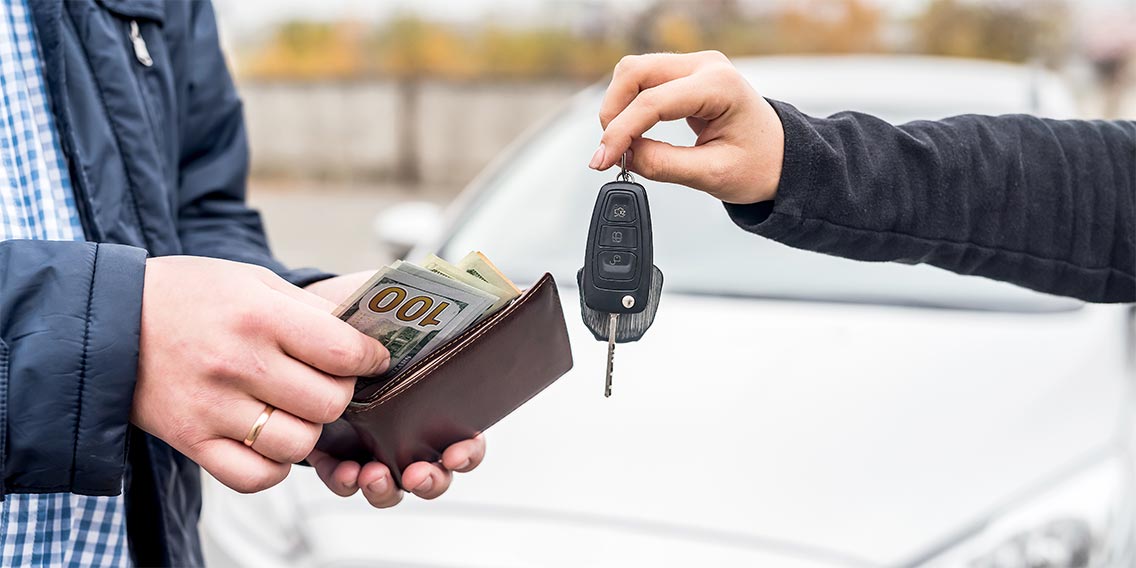AUTO
How to Save Money by Paying Off Your Car Loan Faster
EXPECTED READ TIME:9 minutes
Get-behind-the-wheel-quickly promotions have made it easier than ever to buy a car or truck. They’ve also created a financial dilemma for many American motorists.
Today, auto loans represent the third-largest source of debt among U.S. households, according to a report by the Federal Reserve Bank of New York, trailing only mortgages and student loans. Yet unlike mortgages and student loans, your asset — your car — actually depreciates instead of making you more money over time.
The good news is, paying off your vehicle loan early is one way to help reverse this trend. You can save money over the life of the loan, decrease your debt-to-income ratio, and free up monthly income.
That said, timing is everything. We’ll help you weigh the pros and cons to determine if and when you should pay off your car loan.
Is It Smart to Pay Off Your Car Loan Early?
Many financial experts believe that if you have the opportunity and can afford to pay off any type of debt early, you should do it.
This certainly applies to auto loans, which are generally considered bad debt because they require you to make ongoing payments for an asset that continually loses value.
Be that as it may, trying to pay off your vehicle loan early may not be the most strategic move if you have to tap out your savings or stretch yourself thin to do it.
So, the easiest (and, admittedly, vaguest) answer to the question at hand is, it depends.
If you have the opportunity and can afford to pay off any type of debt early, you should do it.
What Are the Advantages of Paying Off a Car Loan Early?
Accelerating the timeline for paying off your auto loan does have benefits. Here’s a rundown of some of the pros.
Saves Money
You’ve probably heard that the sooner you pay off your debt, the less you pay in interest. This certainly holds true for car loans.
Let’s assume you take out a $20,000 auto loan for 60 months at a rate of 5.00% APR. You’d pay $377 per month for five years, which would total $22,645 over the life of the loan.
The sooner you pay off your debt, the less you pay in interest.
However, if you increased each payment by $50, you could trim seven months from the length of the loan and save more than $350 in interest.
Bump your payments up by $100 each month, and you’d reduce the length of the loan by more than a year and save $620.
Access cash when you need it most with a personal line of credit.
Prevents Being “Upside Down”
When you owe more on your vehicle than what it’s worth, you’re “upside down” on your loan. Paying off your loan early ensures this will never happen, which in turn can make it easier to qualify for personal loans, lines of credit, and other types of lending in the future.
Improves Cash Flow
Once you’ve gotten rid of your car payment, you’ll have extra money to spend each month. Better yet, you can put that additional cash toward other priorities like your retirement savings, an education fund, an emergency fund, student loans, or credit card debt.
Once you’ve gotten rid of your car payment, you’ll have extra money to spend each month.
Provides Peace of Mind
Simply knowing you have less debt can put your mind at ease — a financial and emotional perk in and of itself. Plus, when you pay off your balance early and close your account, that will be one less worry on your mind when it comes to missing a payment or defaulting on a loan.
What Are the Disadvantages of Paying Off a Car Loan Early?
Before you put the pedal to the metal with an early loan payoff off, pump the brakes and consider the flip side. Here are some disadvantages of paying off your loan ahead of schedule.
Since there’s no “standard” prepayment penalty, make sure you know the terms of your loan before paying it off.
Could Trigger Penalties
Some lenders charge prepayment penalty fees, which could potentially cost you more than what you’d save on interest by paying off your car loan early. Since there’s no “standard” prepayment penalty, make sure you know the terms of your loan before paying it off.
Reduces Disposable Income
Putting more money toward your car loan each month can potentially leave you with less cash for eating out, buying clothes, or making other nonessential purchases. A tighter budget can also increase stress because you have less money for unexpected expenses that might pop up.
Keep in mind this is only temporary — after you pay off your loan, you’ll have more disposable income. However, if paying off your loan early with bigger monthly payments sends you into more debt in other areas of your finances, it’s not really worth it. We don’t suggest running up your credit card just to pay off your car loan.
Impacts Your Credit
Paying off your auto loan early will likely lower your credit score for a short period because your credit mix will become less diversified. However, if you have a mix of installment accounts (car loans) and revolving debt (credit cards), keeping one or more accounts open and making payments on time can help you build credit.
| Advantages | Disadvantages |
|---|---|
| Saves money over life of loan | Could result in prepayment penalties |
| Keeps you from owing more than car is worth | Leaves you with less extra cash each month |
| Improves monthly cash flow | Lowers your credit score temporarily |
| Provides peace of mind (less debt) |
Should You Pay Off Your Car Loan Early?
Still not sure whether paying off your car loan early is the way to go? Let’s look at timing. Here’s how to know if you’re in a good place to try it.
Whether you receive a work bonus, tax refund, or some other influx of cash, you could put it toward paying off your loan
When It Makes Sense
Although everyone’s situation is unique, shortening your car loan repayment period makes the most sense when:
- You’re in good shape financially. Think about whether you have enough money to cover bills, day-to-day expenses, and savings contributions. If paying off your loan early won’t interfere with other financial needs, then it might be right for you.
- You have extra funds. Whether you receive a work bonus, tax refund, or some other influx of cash, you could put it toward paying off your loan. After all, you probably weren’t planning on having this extra money, so it won’t affect your budget.
If you have credit cards, personal loans, and other debt with higher interest rates than your car loan, you should probably focus on paying those off first.
When It Doesn’t Make Sense
On the other hand, trying to pay off your auto loan early doesn’t make sense when:
- You have other higher-interest debt. If you have credit cards, personal loans, and other debt with higher interest rates than your car loan, you should probably focus on paying those off first.
- You have bigger-picture goals. Going back to your financial health, you might reconsider an early payoff for your vehicle if it would hinder your ability to meet higher-priority financial goals like saving for a house.
When you refinance your auto loan, you’re borrowing money to pay off your old loan and replacing it with a new one.
What’s Auto Refinancing?
If you’re looking to save money on your monthly car payment but aren’t quite ready to pay off your entire loan, refinancing may be a good path to take.
When you refinance your auto loan, you’re borrowing money to pay off your old loan and replacing it with a new one. Ideally, the new loan will have a better interest rate to help lower your monthly payments.
Refinancing your car loan would be a good idea if:
- Interest rates are lower now than when you took out your original loan
- Your credit score is better now than when you took out your original loan
- Your new loan term isn’t longer than your original one (otherwise you’ll end up paying more in interest over the life of your loan)
- Potential refinancing fees don’t cost more than what you’ll save
Paying one lump-sum amount is by far the fastest way to settle your auto loan before the term ends.
Keep in mind that refinancing might not be the best option if you’re close to paying off your original loan or if your car has lost significant value due to age, mileage, or condition.
Not sure what your car’s worth? Check out any of these resources for prices, ratings, and value information based on your vehicle’s year, make, model, and mileage:
5 Ways to Pay Off Your Car Loan Early
If, after taking an honest look at your financial situation, you decide that paying off your loan early feels right, there are several ways to do it. Remember to confirm with your lender whether these methods will align with your loan’s terms. You can:
1. Pay One Lump Sum Amount
By far the fastest way to settle your auto loan before the term ends, this option will cover the loan balance, interest through your final day of payment, and any other fees. Contact your lender to calculate the final payoff amount and to make sure you have all the information you need.
2. Bump Up Your Monthly Payments
Rounding up your monthly payments to the nearest $50 can help shorten your term. For example, if your monthly payment amount is $268, pay $300 instead.
3. Split Your Monthly Payment in Two
By dividing your monthly payment into half-payments every two weeks, you’ll make an extra full payment throughout the year. Just make sure that you’re hitting the full amount due by your bill’s due date.
4. Make an Extra Payment Each Year
Making an extra payment at any point during the year can shave months off your loan. This goes for any loan, really — just make sure to check if there are any penalties for extra payments.
5. Avoid Skipping Payments
If your lender allows you to skip a payment once a year, don’t do it. A month without making a car payment may seem like a relief, but that payment is simply added to the end of your loan, which means you’ll pay more in interest.
Making an extra payment at any point during the year can shave months off your loan.
FAQs
Let’s clear up any additional questions you have about early loan payoffs.
You paid off your car loan. Now what?
Your lender will send you the car title or release of lien after receiving your final car loan payment. That makes you the official owner.
Does every car loan have a prepayment penalty?
No, certain lenders charge prepayment penalties, but not all of them do. Refer to your auto loan contract for penalty details specific to your loan.
Will your car insurance expenses be impacted if you pay off your car loan early?
Generally, lenders have certain car insurance requirements, which vary by state. Depending on those requirements, you may be able to keep your current coverage or reduce it.
Do extra payments on your car loan go toward the principal?
Extra payments are often applied toward interest or other fees. Contact your lender to specify that you want any extra payments to go toward the principal.
The Takeaway
Deciding if, when, and how to pay off your auto loan early varies from person to person based on your unique financial situation.
If you weigh the pros and cons of an abbreviated payoff period and choose the route that aligns with your short- and long-term financial goals, you can drive with confidence for years to come.
Find Out More About Car Loan Options Through PenFed
Discover the diverse offering of products, services, and support available to our members.




